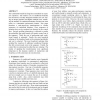Free Online Productivity Tools
i2Speak
i2Symbol
i2OCR
iTex2Img
iWeb2Print
iWeb2Shot
i2Type
iPdf2Split
iPdf2Merge
i2Bopomofo
i2Arabic
i2Style
i2Image
i2PDF
iLatex2Rtf
Sci2ools
109
click to vote
PLDI
1998
ACM
1998
ACM
Improving Performance by Branch Reordering
The conditional branch has long been considered an expensive operation. The relative cost of conditional branches has increased as recently designed machines are now relying on deeper pipelines and higher multiple issue. Reducing the number of conditional branches executed can often result in a substantial performance benefit. This paper describes a code-improving transformation to reorder sequences of conditional branches. First, sequences of branches that can be reordered are detected in the control flow. Second, profiling information is collected to predict the probability that each branch will transfer control out of the sequence. Third, the cost of performing each conditional branch is estimated. Fourth, the most beneficial ordering of the branches based on the estimated probability and cost is selected. The most beneficial ordering often included the insertion of additional conditional branches that did not previously exist in the sequence. Finally, the control flow is res...
Additional Conditional Branches | Conditional Branches | Control flow | PLDI 1998 | Programming Languages |
Related Content
| Added | 05 Aug 2010 |
| Updated | 05 Aug 2010 |
| Type | Conference |
| Year | 1998 |
| Where | PLDI |
| Authors | Minghui Yang, Gang-Ryung Uh, David B. Whalley |
Comments (0)

